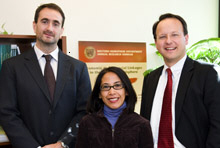SPILLOVER ANALYSIS

Typical street scene in Santa Ana, El Salvador. (Photo: iStock)
IMF Survey: Latin America: Greater Resilience to Shocks
December 3, 2008
- New IMF book examines economic linkages in the Americas
- Latin America's ties with the rest of the world have strengthened
- Impact of global slowdown on region should be significant
For a region that used to be the epitome of recurrent economic crises, Latin America is showing a greater resistance to the financial turmoil than other areas of the globe.

From left: Shaun K. Roache, Joy Villacorte (project coordinator), and Martin Mühleisen. (Photo: IMF)
Arguably, that is partly explained by a profound change in recent years to the economic and financial linkages between Latin America and the rest of the world.
A book edited by Martin Mühleisen, Shaun K. Roache, and Jeromin Zettelmeyer looks at the economic relationship between Latin America, the United States, Canada, and other important economic regions. The book, Who's Driving Whom?, with the subtitle, Analyzing External and Intra-Regional Linkages in the Americas, presents original work mostly by economists in the Western Hemisphere Department (WHD) that sheds light on how these linkages have evolved. IMF Survey spoke with IMF economists Mühleisen and Roache on their work.
IMF Survey online: How did you come to compile this book?
Roache: The book reflects the outcome of what began as a stock-taking exercise on linkages and spillover analysis in WHD in late 2006. A working group of about 15-20 economists set out to have a fresh look at questions of the "if the United States sneezes, Latin America catches a cold" type—with quite astonishing results. The findings of the group—contained in the book's literature surveys and analytical pieces—were also discussed during WHD's 2007 Research Seminar.
IMF Survey online: It is telling that none of the first countries coming to the IMF in the current financial crisis are from Latin America. However, these countries, as you point out in the book, are not immune to the shocks that have hit the global economy. How much do you think Latin American countries will be affected by the current turmoil?
Mühleisen: Latin American countries have done a lot to enhance their resilience to crises over the past years, and the recently-ended commodity boom has certainly helped. However, our work also suggests that trade and financial integration have strengthened Latin America's business cycle linkages with the outside world, and thus one would expect the tightening of credit conditions and slowdown in global activity to eventually have an impact.
For example, the book presents an empirical model that sheds light on the contribution of external shocks to output fluctuations in Latin America between 1994 and 2007. It is estimated that the overall impact of an export-weighted world growth shock on Latin America is roughly one-for-one; in other words, for a 1 percentage point decline in world growth we should expect to see a similar decline in regional growth. Having said that, Latin America is of course a heterogeneous region and the effects on individual countries are likely to vary widely, depending on their economic and financial structure.
IMF Survey online: With the United States verging on a recession, through which transmission channel will Latin American countries be affected the most?
Mühleisen: There is relatively strong evidence that financial linkages have been the most important transmission mechanism for business cycle movements. Capital market movements have been quite rapid, with asset prices providing the key transmission mechanism—less than capital flows which typically reverse with some lag. This said, there is reason to believe that the resilience of Latin America to U.S. financial shocks has increased in recent years: the response of sovereign spreads to financial shocks in the U.S. has been more muted. As economic policies have become more nimble, the amplification of shocks by the financial sector may now be weaker than it was in the past.
IMF Survey online: How developed and integrated with the rest of the world are Latin American financial markets? In the current circumstances, is that a plus or a minus?
Roache: A lot of papers have been written on how financial markets in Latin America have developed in recent years, and indeed we found ample evidence for the transmission of financial shocks from global markets to the region. Monetary policy "surprises" in the United States—which are most widely studied—have had an important impact on local equity markets and sovereign credit spreads. These effects were generally found to be stronger for countries with a pegged exchange rate than for countries with a flexible rate. The intensity of equity market spillovers also seemed to be positively linked to the degree of openness and liquidity of financial markets, and the degree of financial and real integration. These spillovers have increased over time, and that's why it has been important to have in place adequate capital cushions and sound regulatory frameworks.
IMF Survey online: Over the long-term, how can Latin America best take advantage of the potential benefits offered by globalization?
Mühleisen: There is large potential for the region to reap the benefits of globalization without necessarily increasing its vulnerability to external shocks. In general, the findings from our own research and our review of the broader literature suggest that good economic policies—flexible exchange rates, low inflation, and a responsible fiscal stance—tend to produce better growth outcomes, help in the reduction of poverty, and lead to lower degrees of vulnerability.
Indeed, many countries in the region have already made good progress in this direction, both in macroeconomic management and on the structural and institutional front. While the fallout from the crisis will still put some countries in the region to the test, the recent performance of Latin America is testament to the fact that economic and financial linkages between Latin America, the United States, and other regions have undergone profound change.
Comments on this article should be sent to imfsurvey@imf.org







